‘A career challenge’
For much of the last year, Susan Marqusee has made juggling bicoastal job responsibilities a breeze by hacking her work schedule. After long days working on governmental affairs, she switches gears to biochemistry in time for dinner.
“Since I’m located on the East Coast and my lab is in California, I use the time change to my advantage,” Marqusee said. “I start meeting with my students around 6 p.m. Eastern time.”
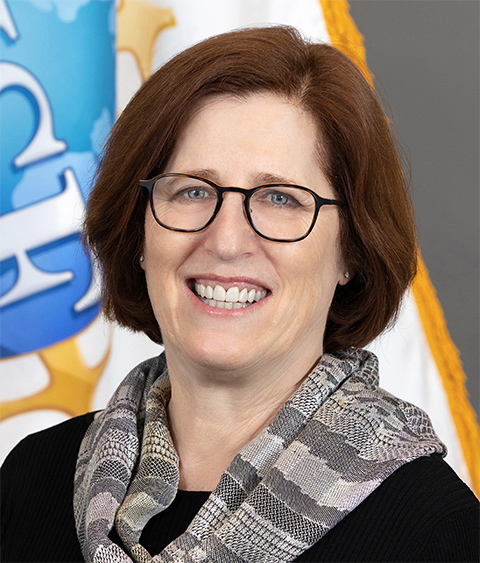
Marqusee is a professor in the Departments of Molecular & Cell Biology and Chemistry at the University of California, Berkeley. Since June 2023, she has also been the assistant director of the Directorate for Biological Sciences, or BIO, at the U.S. National Science Foundation.
An American Society for Biochemistry and Molecular Biology member since 1995, Marqusee won the ASBMB William C. Rose Award in 2012, served on the society’s Council from 2015 to 2018 and was named an ASBMB fellow in 2023.
Driven by a passion for giving back to the scientific community, Marqusee, in 2000, helped establish and direct the California Institute for Quantitative Biosciences, also known as QB3, to fortify science and the economy in California. Last year, Marqusee decided to use her skills to enable nationwide scientific success by taking the assistant directorship at the NSF.
However, stepping into a leadership role at the NSF hasn’t stopped her from maintaining a productive research lab at UC Berkeley. ASBMB Today spoke with Marqusee about how she manages it all. This interview has been edited for length and clarity.
Q: How did you become the assistant director of the directorate at NSF?
Marqusee: I’ve always tried to enable other people’s science through mentorship or administration. I spent a lot of time at Berkeley building and directing QB3. I've had the pleasure to serve as part of many scientific societies with roles as simple as running annual meetings and as complex as being on the societies’ councils. Through these experiences and others, I discovered that I find enabling the science of the community and others, as well as mentoring, just as rewarding as the scientific discoveries themselves.
When I stepped down from running QB3, I didn't know what I was going to do next. But I knew it would probably involve enabling science and the scientific process in some way. At the time although I had some interaction with NSF, I didn’t fully appreciate the intricacies of the agency and its impact.
In fall 2022, I got some phone calls asking if I was willing to be considered for the role of assistant director at NSF. I realized it was a special opportunity, and I had the potential to have a lot of impact. I felt it was my time to give back.
There’s also something very attractive about this role, both for me and for the NSF, in that I could take it as an Intergovernmental Personnel Act hire without shutting down my lab. This isn't a career change; it’s a career challenge because I have two jobs right now. I hope that I will have a positive impact on the NSF and science in the nation. I'm absolutely sure the NSF is going to have a major impact on me as a scientist.
Q: What is your role at the NSF? What does your day-to-day look like?
Marqusee: My role as the assistant director is overseeing the Directorate for Biological Sciences. Each directorate has a budget of about $1 billion. So, I spend a lot of time with the budget. I also work with the NSF director and other staff to examine how to move the NSF mission forward. The mission of the BIO Directorate is to enable discoveries for understanding life. So, I spend time thinking about that both locally within BIO and broadly as a part of the agency mission. I also think at a very detailed level about how to get money into scientists’ hands.
What I do day-to-day changes and it's been a very steep learning curve. I spend about half my time working on BIO-specific issues, including the aspects of science that will further our mission. NSF has a global and holistic approach to science in the community, and that appeals to me. We think about what science we need to support to move BIO forward as well as how we create a scientifically competitive nation. The other half of my time is spent as the BIO voice at the agency level and across the government as a whole. For example, last year there was an executive order on advancing biotechnology. Our job is to turn executive orders like this one and other initiatives into reality in a coordinated fashion.
Q: What are some of your goals for BIO directorate?
Marqusee: NSF is kind of like a university. We have directorates that are like colleges, and we have divisions that are like departments. Those divisions are important for administration. But science doesn't fall into those neat boxes. So, what I want to do is enable cross-interactions among these areas. Young scientists don’t box themselves in, and I want to adopt that mentality here.
NSF has a great history of focusing on fundamental research, but we do not do a great job of letting society know about the tangible benefits from that research. So, another one of my goals is to communicate that.
I also want to enable the rapid translation of our discoveries into societal benefits without compromising the need for curiosity-driven research. We want to make sure we're funding the most exciting new areas of science, but science is getting so expensive. I just want to encourage people, when they apply for a grant, to ask for what it takes to do the research in the grant.
Finally, a big goal of ours is widening access to science so we can be competitive as a nation. For example, cryogenic electron microscopes are very expensive, and we can’t have them in every little corner of the country. So, we are working on creative solutions.
Q: How do you maintain your research lab in addition to holding a position at NSF?
Marqusee: I spend about 80% of my time on NSF duties. The rest I spend focusing on my laboratory. Since I’m located on the East Coast and my lab is in California, I use the time change to my advantage. I start meeting with my students around 6 p.m. Eastern time.
I probably overestimated the amount my students need to rely on me. They have really risen to the occasion. They're all quite independent. The science is ongoing, and it hasn’t suffered. I worried about leaving my lab for this position, but it has been a risk worth taking.
I've never not been in academia, so this dual role is very out of my comfort zone. It's exhausting. For me, the main challenge has been this work–work balance. It reminds me of when I was a young parent and an assistant professor, and I felt like I was terrible at everything. I feel overcommitted, but that is just because everything is new. In the beginning of this role, when people asked me how I felt about it, I think I just felt proud of getting outside my comfort zone.
Q: What are your favorite and least favorite parts of your job at NSF?
Marqusee: My favorite part of the job is the people I work with. They are amazing and very mission-driven. They want to get money into everybody's hands and make sure everyone has access to what they need to do science. To do these things, the people here make data-driven decisions to impact science broadly. It’s very different from academia, where you're very focused, in your own laboratory, on every publication.
It’s a crazy time in biology right now. We are grappling with what the role of a graduate student is, proper compensation, the role of a postdoc and the rising cost of science. We are at a disequilibrium right now, and these problems need to be seriously considered.
NSF is an exciting place to work. I’ve been to the White House, and I got to take a selfie with Tony Fauci. I actually did not grow up in the U.S.; I grew up and went to high school in Europe. So it's been an amazing experience to learn about the government and live in Washington, D.C.
When you're working within the federal government, momentum is hard to gain. The system is reluctant to change. Getting things done on a budget is difficult and we’re always working on multiple budgets at one time – the one we’re spending and the ones were planning; some of my impact will play out after my time. But I think academia has the same frustrations.
In academia, we have a rare privilege of being able to think about whatever we want to think about at whatever time of day. But now, I have no control over my schedule. I find it difficult to find time to think about and absorb what I've been given.
When you’re on a college campus, there’s a sense of potential at the beginning of the school year. As a forever student, I miss being able to experience that.
Q: What advice would you give young scientists interested in a career like yours?
Marqusee: If you want to be involved in research and policy, get a really solid scientific training and follow your passion. Make sure to surround yourself with mentors who see a big picture, who really appreciate people, science and society.
I believe a Ph.D. is a really important thing that allows you to become an expert. Ph.D. research is a very privileged time when you get to think about one thing.
Look for things to bring you joy and remember that nothing is forever. I like to think things could change at any moment. Be willing to stretch yourself.
Enjoy reading ASBMB Today?
Become a member to receive the print edition monthly and the digital edition weekly.
Learn moreFeatured jobs
from the ASBMB career center
Get the latest from ASBMB Today
Enter your email address, and we’ll send you a weekly email with recent articles, interviews and more.
Latest in People
People highlights or most popular articles

Notebook scribbles to synthesis pathways
The discipline Kendrick Smith learned as a musician helps him stay focused at the bench.
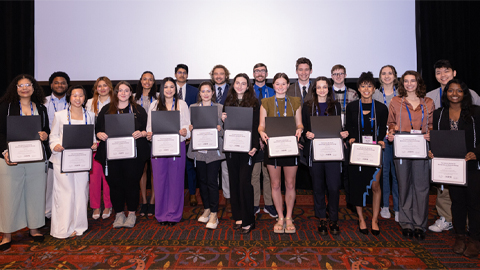
ASBMB inducts new honor society members
Chi Omega Lambda, which recognizes exceptional juniors and seniors pursuing degrees in the molecular life sciences, has 31 inductees in 2024.
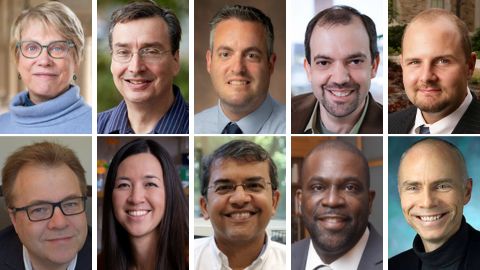
2024 voter guide
Learn about the candidates running for ASBMB Council, Nominating Committee, Publications Committee and treasurer.
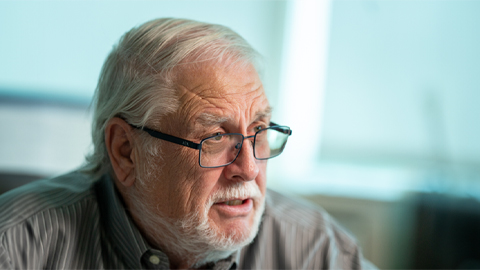
Charles O. Rock (1949 – 2023)
Colleagues and trainees remember a world expert in membrane lipid homeostasis.
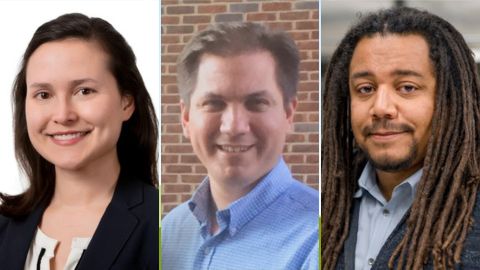
Honors for Clemons, Hatzios and Wiemer
Awards, honors, milestones and more. Find out what's happening in the lives of ASBMB members.
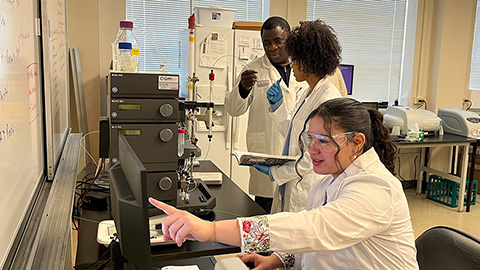
Touching the future from the bench
Scholar, scientist, teacher and mentor Odutayo Odunuga discusses the important roles of the institutional PI, his journey and his research.

